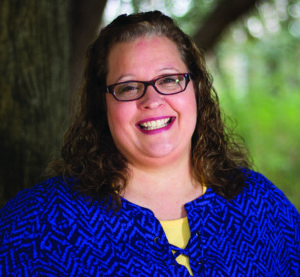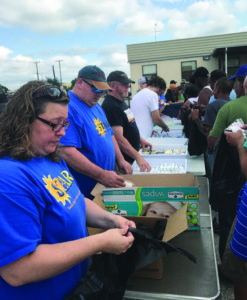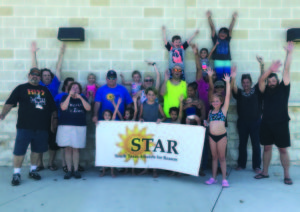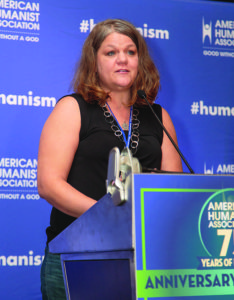Cherri Pitts: A Rose Amongst San Antonio’s STARs
 Photos courtesy of South Texas Athiests for Reason
Photos courtesy of South Texas Athiests for Reason Cherri Pitts has been an active member of South Texas Atheists for Reason (STAR) since February 2016 and became STAR’s director of administration in July of 2016. She’s also a regular volunteer at the atheist/humanist meetings at Lackland Air Force Base in Bexar County, Texas. Pitts has a BA in business management and is the mother of four and grandmother of two. She and her husband Jerry live in San Antonio, Texas, with their two rescue dogs Apollo and Luna.
This interview originally appeared in the online newsletter of the United Coalition of Reason on July 22, 2017, and has been lightly edited.
Susann Heap: Do you have any military experience that led you to regularly volunteer at Lackland AFB? What inspired you to give so much time and effort to that work?
Cherri Pitts: I was in the Navy Reserve from 1990-1993 in my early twenties. I enjoyed my time there and learned a lot, especially about diversity and how we all want the same things, even when we just can’t seem to agree on how to achieve them. I first got involved with STAR as a social group about eighteen months ago to be around like-minded people. I’m actually an introvert and didn’t like speaking in public. [STAR cofounder and Executive Director] Victoria Gettman invited me to attend the Lackland meetings a few times and said she needed support for some changes that were happening with the regular volunteers. After going to a few of these meetings, I was hooked. It took me about six months to even introduce myself, but the energy and joy I see on the trainees faces makes me feel good about what we’re doing. They were very supportive when I was nervous and they would say, “You’re doing great!”
The trainees and airmen have shared their deepest fears, sorrows, and pain with us, and we don’t take that lightly. I have a great time each week because they make us laugh and cry, and I feel a very personal connection to them as a group: that’s why I keep going back. I know what it was like in boot camp, being separated from your family, friends, and experiencing culture shock. They tell us they get to feel “human” again for a few hours each week. That inspires us to keep going and to share time with them.
SH: When you hear the phrase “No atheists in foxholes,” how does that make you feel, given the work you do with military trainees and your prior military service?
CP: I think “No atheists in foxholes” is a statement of ignorance. I understand as a phrase it’s trying to portray a time of desperation when anyone faced with a life or death situation would try to pray to stop the horrible circumstances… why not, “just in case” there’s a god to meet in the afterlife.
However, most atheists and humanists I know understand that war is an outcome of people’s decisions: we are responsible for our own actions, and the atrocities brought on by war are usually religiously based or at least influenced by religious fervor. It doesn’t mean we shouldn’t fight for our freedom and keep out those who threaten it; it just means that we understand we’re fighting against another human being—another person—who believes their own religion’s lies and thinks they will get some glory from their god for their disgusting behavior. Nontheists know the difference and are not justifying our actions for a false assumption.
SH: Can you tell us about a time when you feel your work with STAR really made a difference, either to you or to the people of the communities that you serve?

Photos courtesy of South Texas Athiests for Reason
CP: I hope that everything STAR is doing each week is making a difference. That’s our purpose. We work at the San Antonio Food Bank on the first Saturday of each month to help in the garden that feeds thousands in the surrounding counties each week.
We also partner with Habitat for Humanity and assist in the building of houses when possible. We’ve had the chance to meet some of the homeowners and are so glad we could be a part of starting their new lives.
We have a giveaway on the last Sunday of each month to the homeless of San Antonio. We help an average of 100 homeless people by giving them personal hygiene supplies, all of which are purchased with donated money.
And of course, every Sunday we have the atheist/humanist service at the Lackland AFB. Since I started attending, it’s grown from 300 to over 1,000 trainees. It’s been amazing to be a part of this and we get a personal story almost every week from at least one graduate about how it helped them to have this service.
I also don’t want to pass up the opportunity to thank the Gettman family for all they’ve done for my family. They are such an awesome support in my life. I’ve had several life-changing issues, and they have been through all of it with me. Their support has made and is continuing to make a difference in my life. Without their friendship and the support of the STAR group, I couldn’t do what I do for the trainees or feel the sense of purpose that I do now.
SH: If someone was considering doing military outreach (especially a religion-focused “extracurricular” activity), what advice would you give regarding the qualities needed and the pitfalls and pleasures of this kind of work?
CP: I think the most important advice is to be consistent! By that I mean: start and end on time, be organized, and keep a consistent format. Structure is important so they know what to expect and when to expect it. That doesn’t mean you can’t change up the content a bit or tweak it, but make sure people are aware of what to expect each week.
Second, ask for and listen to feedback. Ask often—once every few months, but don’t let participants get out of hand and disruptive. For example, we asked attendees what they would like added or changed and they said they wanted music. We started playing before and after the service and were taking some requests (honestly, their favorite song is “Don’t Stop Believing” by Journey!). As a policy, we review the songs before playing (if we aren’t already aware of the lyrics) to make sure they’re appropriate and give a positive and community-building mood.
I remember one time, I thought it would be good to put the song list on the screen for them to pick what song to play next and they ended up yelling at me and competing over the next song. It was more stressful for me than I expected. I took down the list and now just play what I feel is needed for the mood [choosing from] the latest pop hits or game/movie soundtracks that are popular and throw in a few classics for sing-a-longs. It seems to be working well now. It makes me happy when they dance or I see them singing along or clapping. It’s pretty fun to hear them all singing together and clapping.

Photos courtesy of South Texas Athiests for Reason
SH: Texas seems like a place where a person’s religious beliefs are really important. What have your experiences been when people find out that you’re an atheist who’s doing a lot of wholesome work that benefits the greater community, regardless of their beliefs?
CP: Not long ago at the Atheist Helping the Homeless event, one lady who was in line for personal hygiene items asked me what “uh-theist” meant. When I corrected her pronunciation her eyes got big and she said, “You don’t look like one.” I said, “We do good too, and we have a sense of morality and ethics.” It’s worth mentioning she didn’t get out of the line! I’m still uncertain as to what an atheist is supposed to look like; maybe next time I get that, I’ll ask. In Texas, the word “atheist” still carries a stigma.
In my personal life, I have family members who won’t discuss it, even though I know they know this is what I do and believe, despite others in my life who are fine with it and accept my choices. I can’t help what the label of “atheist” or “humanist” means to them unless they ask me, and then when they do I will share what it means to me. There’s a difference, though: I will not proselytize to them. If they talk to me, then I feel as if they’re ready to hear my answers. Until then, I focus on our STAR family, its events, and the work that needs to be done, and I also focus on my immediate family.
STAR’s Origins

© Carissa Shedeker
Victoria Gettman served in the US Army for twenty years and earned her master’s degree in healthcare management. It was in her twenties when she first discovered her atheism; a realization she came to while her daughter was completing her first communion in the Catholic Church (Victoria and husband Jed have five children).
Gettman became the director of the San Antonio branch of the Military Religious Freedom Foundation (MRFF) after witnessing religious influence in her own military training. Shortly after, she began working with the Military Association of Atheists and Freethinkers (MAAF) and later became MAAF’s Joint Base San Antonio point of contact. In 2013 Gettman created the atheist/humanist meeting at Lackland Air Force Base and, alongside her teenage daughters, founded Atheists and Humanists Helping the Homeless in San Antonio. Getmann is also the co-founder and executive director of South Texas Atheists for Reason (STAR), providing low cost or free community gatherings for nonreligious families. For all of her wonderful work, Victoria Gettman was given the American Humanist Association’s 2016 President’s Award, presented at the AHA Annual Conference in Chicago, Illinois.
